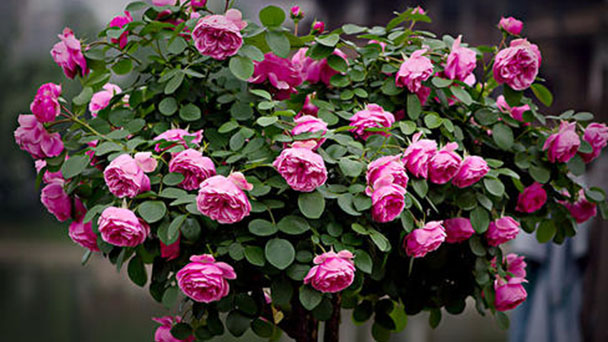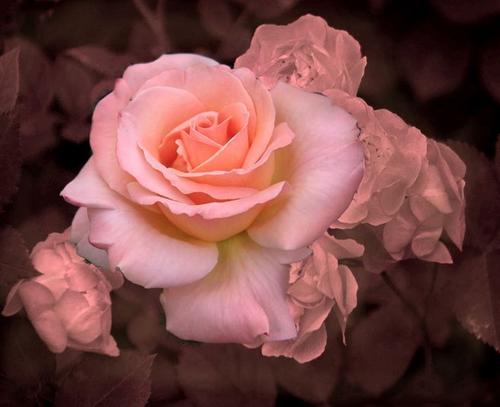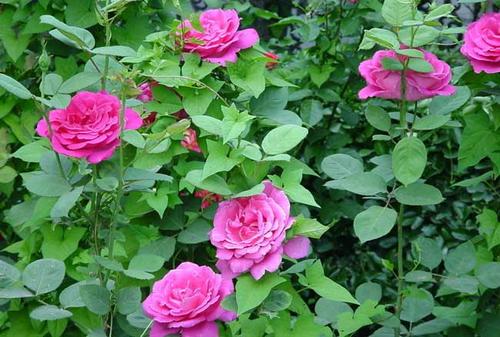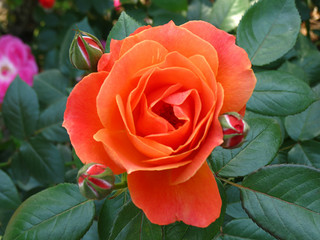Rosa chinensis Jacq profile
Written by Maggie
Jan 12 2021

Rosa chinensis Jacq is evergreen and semi-evergreen low shrub that blooms all year round. It is usually red, or pink, occasionally white and yellow. It can be used as an ornamental or medicinal plant.
Rosa chinensis Jacq picture

Morphological characteristics of Rosa chinensis Jacq
Rosa chinensis Jacq is an upright shrub, 1-2 meters high; the branchlets are stout, cylindrical, nearly glabrous, with short, hook-like thorns. Leaflets 3-5, sparsely 7, even petiole 5-11 cm long, leaflets wide ovate to ovoid oblong, 2.5-6 cm long, 1-3 cm wide, apex long acuminate or acuminate, near base Round or wide wedge, with sharp serrations on both sides, almost glabrous on both sides, dark green on the top, often shiny, and lighter in color on the bottom. The terminal leaflets are stalked, and the lateral leaflets are nearly sessile. The total petiole is longer and has Scattered skin thorns and glandular hairs. Most of the stipules are adjoining to the petioles, only the top part is separated into ears, and the edges often have glandular hairs.
The flowers are clustered, sparsely solitary, 4-5 cm in diameter; peduncle 2.5-6 cm long, nearly glabrous or glandular-hairy, sepals ovate, apex caudate acuminate, sometimes leaf-shaped, often feathery at the edge. Shaped lobes, sparsely entire, glabrous on the outside, densely pilose on the inside; petals double to semidouble, red, pink to white, obovate, concave at the apex, wedge-shaped at the base; style free, protruding calyx Outside the tube mouth, approximately as long as the stamens. The fruit is ovoid or pear-shaped, 1-2 cm long, red, with sepals shed. The flowering period is from April to September, the fruiting period from June to November.
Rosa chinensis Jacq growth environment
Rosa chinensis Jacq does not have strict requirements on climate and soil, but it is more suitable to be loose, fertile, rich in organic matter, slightly acidic, and well-drained loam. rosa chinensis jacq likes a warm, sunny, and airy environment. The optimum temperature for most varieties is 15-26°C during the day and 10-15°C at night. When the temperature is lower than 5℃ in winter, it enters dormancy. Some varieties can tolerate low temperature of -15℃ and a high temperatures of 35℃. When the temperature in summer continues above 30℃, they will enter semi-dormancy, plant growth is not good, although it can also conceive buds, but the flowers have few small petals, and the color is dull and lose the ornamental value.

Rosa chinensis Jacq distribution range
China is one of the origins of rosa chinensis Jacq. In China, it is mainly distributed in the mountainous areas of Hubei, Sichuan and Gansu provinces, especially in Shanghai, Nanjing, Changzhou, Tianjin, Zhengzhou and Beijing.
Rosa chinensis Jacq main value
Landscaping
Rosa chinensis Jacq has an indispensable value in landscaping. Rosa chinensis Jacq is the most frequently used flower in north and south gardens. Rosa chinensis Jacq is the main ornamental flower in spring. It has a long flowering period, high ornamental value and low price. It is loved by gardens everywhere. It can be used to arrange flower beds, flower borders, garden flowers in gardens, and can be used to make rose bonsai, cut flowers, flower baskets, bouquets, etc.
Rosa chinensis Jacq is mainly used for vertical greening because of its climbing growth characteristics. It has a unique role in gardening streetscape and beautifying the environment. If it can form pleasing energy paths and styles, it can be made into various arches, grids, and frame-like shelves for Rosa chinensis Jacq to climb. After proper trimming and shaping, it can decorate buildings and become a clever connection between buildings and gardens.
Environmental protection
Rosa chinensis Jacq can be made into continuous flower fences, flower screens, flower walls, used in offices, schools, residential quarters, urban squares and other places. It can not only purify the air, beautify the environment, but also greatly reduce the noise pollution in the surrounding area and relieve the heat The greenhouse effect of summer cities. Rosa chinensis Jacq is also an expert in absorbing harmful gases. It can absorb harmful gases such as hydrogen sulfide, hydrogen fluoride, benzene, phenol, and has strong resistance to sulfur dioxide and nitrogen dioxide. Therefore, Rosa chinensis Jacq is also good for protecting the human living environment.

Medicinal value
Flowers can extract spices. The roots, leaves, and flowers can be used as medicine, and have the effects of promoting blood circulation, reducing swelling, reducing inflammation and detoxification. And it is a good medicine for gynecology. Chinese medicine believes that Rosa chinensis Jacq is sweet in taste and warm in nature. It has the effects of promoting blood circulation, regulating menstruation, reducing swelling and detoxification when entering the liver meridian. Because Rosa chinensis Jacq has obvious effects of removing blood stasis,and relieving pain, it is often used to treat irregular menstruation and dysmenorrhea.
Latest Updated
- Benefits of Bugleweed - 7 Science-backed Health Benefits
- Bugleweed Dangers & Side Effects - Is It Poisonous?
- How to Plant Evergreen Trees - What You Should Know
- When to Plant Evergreens - Grow Guide for Evergreen Trees
- 12 Wonderful Evergreen Shrubs for Your Garden
- 12 Popular Evergreen Plants with Pictures for Beginners
- When And How To Prune A Lilac Bush Like a Pro
- How to Grow & Care for Lilac Vine (Hardenbergia Violacea)
- Japanese Lilac Tree (Syringa Reticulata) Care & Propagation Guide
- Shumard Oak Pros and Cons - What to Know
Popular Articles
- Winter maintenance of Antirrhinum Majus
- How to Grow Terminalia Mantaly Tree
- How to Grow and Care for Crossostephium Chinense
- How to grow Antirrhinum Majus in spring
- Peristeria Elata (Dove Orchid) Profile: Info & Care Guide
- Underwatered Snake Plant (Sansevieria Trifasciata) - Signs And How To Fix
- How to Care for Brazilian Jasmine Plant (Mandevilla Sanderi)
- How to Grow & Care for Graptopetalum Purple Delight in Summer
- Rosa Chinensis (China Rose): Plant Growing & Care Tips
- How to Care for Baby Sun Rose (Aptenia Cordifolia)